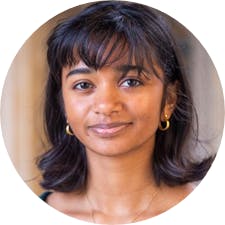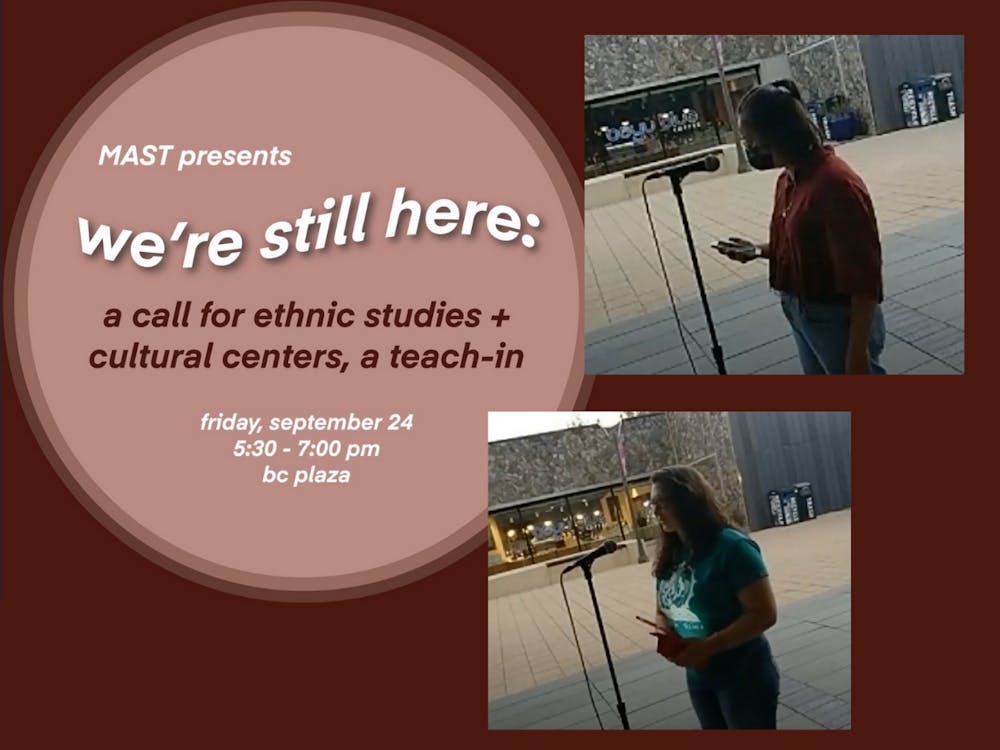Duke is simply not doing enough for its Asian community, said speakers at a Friday event held by Mobilizing Asian Students Together at Duke.
On Sept. 24, MAST hosted a teach-in on the Bryan Center Plaza, where students, faculty and staff called on University administration to support marginalized students, ethnic studies and cultural centers. Speakers at the event reiterated demands from campus cultural groups and relevant departments.
“Duke fails time and time again to ensure its students of color and minority students are institutionally included in all academic and social settings,” said junior Miriam Shams-Rainey, who emceed the event.
“Duke fails to seriously invest in ensuring that Ethnic Studies departments that explore the histories and reality of people of color, both in the United States and in the wider world, are treated as critical sources of knowledge,” Shams-Rainey continued.
Shams-Rainey also repeated the demands released by Duke Asian Students in March 2021 and reiterated since then. These include demands to institutionalize an Ethnic Studies department, create cultural centers that better serve the needs of students, disaggregate admissions data for Asian, Asian-American and Pacific Islander students and a call for systems of accountability in response to hate and bias incidents.
These demands were echoed by other speakers, including senior Scarlett Guy, a member of the Eastern band of the Cherokee nation and president of the Native American Student Association.
Guy detailed the history between Duke and Native Americans, starting with the Cherokee Industrial School, where Trinity College of Arts & Sciences admitted 12 children from the Eastern band of the Cherokee nation and worked to assimilate them.
“Duke, as a result of them having the Cherokee Industrial School, directly contributed to the endangerment of my people’s language,” Guy said.
Guy recalled the lengths she had to go to to take Cherokee language classes—none of which are offered at Duke—ultimately having to take classes at University of North Carolina-Chapel Hill through Duke’s interinstitutional program.
“I was very homesick not just because I missed my family, but I missed being in Cherokee, just having the mountains around me, just being in my home. And I would go to Chapel Hill to experience that because I couldn't experience it here,” Guy said.
This experience, along with the lack of advisors who understand her interest in community-centered careers, is why she thinks Duke needs to have more resources for Native American students.
“That way, other students coming in don't have to have my experience. They can stay at Duke to take the classes they want to take and to have the advisors they need,” Guy said.
Ziya Joy, Trinity ‘20, called on the University to treat student organizers better and make Ethnic Studies courses available.
“You shouldn't have to go out of your way to learn your history, or learning your history or language or culture should at least be an option, which it never was for me and it wasn't for many others,” Joy said.
“You should be able to explore geopolitics without the extreme bias of American imperialism, white supremacy and Eurocentrism, which plagues so many of our departments. But today is a reminder that student organizers and young people are not so easily intimidated,” they continued.
Other speakers described and drew parallels between previous student activist efforts and current calls-for-action.
Calvin Cheung-Miaw, assistant research professor of history, began by presenting a history of Asian American Studies at Stanford University, starting with the 1989 takeover of the president’s office, where students advocated for an Asian American Studies program along with 119 other demands.
This history, he said, shows that to care about Asian American Studies at Duke in 2021 is to “care about the struggle.”
“It's to believe that the struggle is based on a belief that we have rights. We have the right to demand that this university change, we have the right to demand that this university reflects our experiences, our community's needs,” Cheung-Miaw said.
Esther Kim Lee, professor in theater studies and international comparative studies and director of the Asian American and Diaspora Studies program, discussed how in starting her position in AADS, there was no space, support or staff for the program.
Get The Chronicle straight to your inbox
Sign up for our weekly newsletter. Cancel at any time.
Lee cited the moratorium on new certificate programs implemented in 2016 and the inability to create a minor program separate from an existing major as structural issues that “[make] it difficult for a new, innovative, exciting field like Asian American Studies to even get started.”
“That’s the kind of lack of resources that I’m faced with,” Lee said. “I'm doing my best. I'm hitting lots of walls.”
But the students who advocated to make the program possible challenge her to “fight as much as [she] can,” Lee said.
“I'm really honored that over 20 years of activism, that's at the foundation of the program, and I'm going to really use every ounce of energy that I have to build a program.”
AADS Visiting Scholar Rachel Kuo spoke to the relevance of ethnic studies, especially in national, political conversations and in discussions on the impact of modern technology.
“I think the kind of momentum of organizing and demanding these spaces, to know how pressing the intellectual and political questions that emerge from a field of study that is not neutral and is politically committed to liberation is so important,” Kuo said.
A lack of space for cultural organizations was noted by several speakers, including senior Sebastian Ochoa, president of Mi Gente.
“The past few years, there's been a large influx of new Latinx student organizations… I'm sure this also holds true for Asian and Native student organizations as well,” said Ochoa.
“Clearly, there's an increased desire for representation on campus,” Ochoa said.
Maryam Arain, student development coordinator for the Center for Muslim Life, led the group in a pranayama breathing exercise, noting that to “stay grounded, build community, experience joy and heal ourselves” in the “face of active marginalization,” activists must reconnect with themselves.
“Your wellness keeps your soul rooted, your vision and mind sharp and your vessel clear for healing. Stay the course. Be a keeper of the visions instead of the pain,” Arain said.
Anna Storti, assistant professor of gender, sexuality and feminist studies, noted that ethnic studies is an “institutionalized and sanitized version of third world studies” and that it is important to understand the discipline as “relational.”
“Thinking relationally is not easy, but it is a crucial step in solidarity,” Storti said.
“I suggest we loosen Asian American studies from Asian American people. In doing so we get to analyze the material conditions that shaped Asian life and the lives of all. Thus, we encounter the many ways people of color profoundly challenge power and the dislocation it produces.”
Elmer Orellana, former student development coordinator in the Center for Multicultural Affairs, spoke to the importance of cultural spaces on campus.
“We need spaces where we can be ourselves, our whole selves, in community with each other, to bring solidarity amongst our groups. And my hope is that, you know, this is the last time we have to demand for spaces, for spaces for us to feel like we belong, that we matter,” Orellana said.
“Even after the establishment of Ethnic Studies, a cultural center, there's still work to be done,” sophomore Celine Wei said at the event’s closing.

Preetha Ramachandran is a Trinity senior and diversity, equity and inclusion coordinator for The Chronicle's 118th volume. She was previously senior editor for Volume 117.

